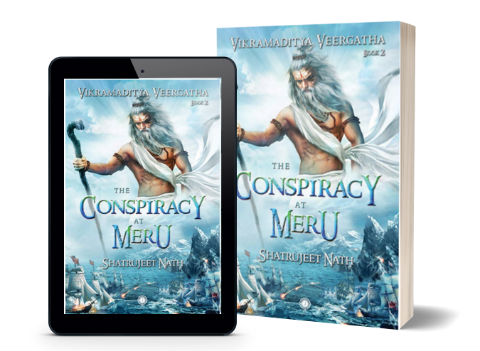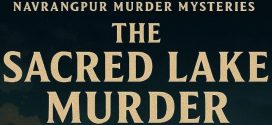The name Vikramaditya symbolises the Ideal King in Indian minds – the Pardukhbhanjan king that went out in the nights to find out how his people were, the king who achieved many impossible feats with from Gods and help of his supernatural friend Vaitala, the king who is a hero, in so many folk tales spreading across Bharatvarsha and captured through numerous works of literature.
This Is Here In For You
Listen To The Podcast:
If you love to listen to the book review over reading, or if you want to go through it while doing other activity, here is our Podcast of this review article. Do listen, and share your thoughts with us.
Spotify:
YouTube:
And although some of these stories might be works of fiction, there is no doubt that Vikramaditya was a well-loved king and his reign of Avanti is immortalised through not only works of Kalidasa including Meghdootam and Raghuvansham, but also through the “Vikram Samvat” calender that is still our way of marking time.
| Book Title | : | The Conspiracy at Meru Vikramaditya Veergatha Book 2 |
| Author | : | Shatrujeet Nath |
| Publisher | : | Jaico Publishing House (22 August 2016) |
| # of Pages | : |
408 (Paperback) 2914 KB; 408 (Kindle EBook) |
| # of Chapters | : | – |
| Purchase Link(s) | : |
So, it was with a lot of interest that we picked up Shree Shatrujeet Nath‘s Vikramditya Veergatha books. And if you have read the review of the first book in the series – The Guardians of the Halahala, you would know that we thoroughly enjoyed it. And with a lot of enthusiasm we have gone on to reading this series for Team Thinkerviews. As promised, here is a review of the second book in the series – The Conspiracy at Meru.
Book Cover:

The Conspiracy at Meru | Vikramaditya Veergatha Series | Second Book | Cover Page
Book Plot:
At the end of the first book, we left Ujjayini victorious, but broken. Multiple attacks from Devas and Asuras had left the city battered and its citizens are dealing with incredible amount of loss of people and property. Also, the cream of the Imperial Army is up against the massive Huna invasion imminent on the Western borders of Sindhuvarta and Shoorsena has succeeded in becoming king of Magadha and capturing its neighbour kingdom of Vanga. He is now definitely a threat to the alliance of Sindhuvarta kings led by Samrat Vikramaditya.
Carrying on these threads, the Devas have finally realised that they underestimated the courage and power of Vikramadity and his council of Nine. So Indra has gone to Alaka to seek Kubera’s help, deciding to use cunning and sorcery rather than brutal strength. Shukracharya carries on to hide his identity and is staying on in Ujjayini as the Healer. He discovers that his regeneration spell during the battle with Maruts have woken up the power of Nine Pears and the Councillors are getting more powerful every day. While he has an idea on where the dagger with Halahala is hidden, Shukracharya has so far not been able to find a way to retrieve it.
In order to buy time, Shukracharya asks Hiranyaksha to attack Amravati knowing that Indra is away and such an attack will keep Devas busy on home front and hence not looking for the dagger. However, unbeknownst to both Shukracharya and Indra, Indra and Sachi’s son Jayanta has decided to call on to the primordial serpent-dragon Ahi and let it loose on Ujjayini.
And so all these threats collide, as Ahi attacks Ujjayini, burning people and palaces alike where he spews his venom on the same day that the Yaksha sent by Kubera attacks Vikramaditya and his wife Vishakha, who have gone outside the city and to the meadow where Vishakha fell from a horse and lost her memory. History is just about to repeat itself.
With Shukracharya’s help, Ujjayini survives the attacks, but at great costs. Shukracharya’s cover, however, is blown and Vikramaditya asks him to leave knowing full well that if he allows any more services from the Healer, he will have to give up the dagger when Shukracharya will ask for it.
It is during this time of great sorrow, that Vikramaditya also has to deal with Heheya’s attempts to align with Magadha and the news of the bloody battle of Dvarka that has left Anarta’s jewel of a city burning and ruined.
Surely, things can’t get any worse?
But no, Shukracharya thwarted on one front has already planned to forge an alliance with Devas. And so they all meet at Mount Meru and conspire to defeat Vikramaditya by tearing apart his life and his council of Nine.
Soon enough, Vikramaditya loses a fried dearest to his heart and has almost lost his brother. Will he lose the trust of not only his Councillors but his people too?
Views And Reviews:
I have outlined the plot only briefly above to keep the spoilers at bay in this saga involving so many narrative threads and characters. Because the author moves on from one to the other narrative giving us glimpses into what the characters are facing and then providing the background of the events, the story keeps up a tight pace and keeps moving forward. It is a true thriller with not only action but also the complexity of so many characters moving on a chessboard. And now that we have some background on everyone, we also see how the unintended and unforeseen consequences are going to result from long-forgotten actions.
I find it only logical that after the first few defeats, the Devas and Asuras reassess their strategies, fight with one another only to give it up to become allies to face a common foe. This is completely in character with what we know of them from ancient stories.
There is so much intertwined history of blood and betrayal between these estranged brothers that the past will always affect their present and future actions. Neither of them are known for their selflessness or nobility at all times, but we definitely know about their egos, nepotism, occasional cruelty and greed. Shtrujeet Nath has captured the essence of these characters very neatly and has made them believable as part of his saga. Being human is sometimes preferable to being such immortals with questionable morals and so it is that we can’t help but love and admire Vikramaditya and his council.
Although Vikramaditya is not always on centre stage of this book, we are always aware of his presence through every single scene. He is the source of power and inspiration for his entire kingdom. In spite of his personal grief, he has the courage to face difficult decisions. But he is also not lost in arrogance. As is natural, in this book he does question his decisions at times:
A test… or maybe a punishment. Veeshada’s dagger has descended on me like a curse, taking everything that I hold dear. I couldn’t protect the woman I love; I can’t protect my people. What do I tell them when they ask why the dagger is more important to me than their lives? What do I say to those fleeing their homes out of fear? I have let the people of Ujjayini down badly. The live of innocents who have nothing to do with the dagger or the promise I made to the Omniscient One? And all in the knowledge that more lives will be sacrificed the next time the Devas or Asuras send a monster after the Halahala?
But in spite of these moments, he always tries to do the right thing, tries to never lose sight of his moral duties, even when he is faced with barbaric acts:
Our fight is not for ownership of a fertile piece of land. It is about defending the sanctity of ethics and fairness and dignity – about defending humanity. If we forsake those very values in war, we become the very thing we are fighting against. We become them. Then what do we have left to fight for?
“No matter how deep our love for someone was, that love should never colour our judgement of what is fair, just and right.”
“I will not knowingly incur a debt that I cannot repay.”
As Shukracharya says to Indra, Vikramaditya is the man who sacrifices his deepest hopes and yearnings for the sake of his duty. No lesser mortal could have taken the pledge to protect the Halahala and shown the courage to see it through.
And he is lucky to have his loyal Council of Nine. As this book progresses, we learn a little bit more about the lives of these royal supporters as well. We saw Vararuchi, Shankubala and Kalidasa showcasing their powers in the battle with Maruts in The Guardians of the Halahala. In this book, we see Amar Simha turning into a man-lion (Narsimha?), Kshapanka’s immunity to venom and Varahmihira’s ability to project energy shields in the battle with Ahi. While they are aware now that they have gifts, they need to understand and control these powers such that they are channeled for good:
We all have gifts, though most of us sadly never discover it for ourselves. It’s not a choice, we just have it. But knowing you have a gift and doing something useful, something good with it – that is a choice. That is why you must learn to master your gift, control it, and wield it with wisdom.
The concept of a Council of Nine has repeated itself through our history, whether it is Akbar’s Navratna or King Bhoja’s court of Nine. There are a few more books in historical fiction genres that use a similar set of characters. As far as Vikramaditya Veergatha series is concerned, the concept works beautifully. The author has selected some great names and stories for his Council of Nine and it is very enjoyable to read through a variety of their adventures.
In addition to these primary characters, there is a whole set of secondary characters who appear and disappear on the scene and yet play key role in either their loyalty or their treachery to the empire e..g., Governor Satyaveda of Malawa who has been holding a long term grudge against Avanti and has been consorting with Hunas in secret or brave courtier Pallavan of Kosala who ends up in prison of Magadha while trying to expose their prince Shoorsena as a murderer. There are countless such examples who although have little stage time, are still important spokes of this wheel.
Once again, the author has given us an excellent tale featuring wonderous characters – humans as well as monsters – filled with escapades and excitement. There are many battles here and each one is fought with ferocity and courage. Let me share some of the battle quotes:
In battle, it is not the strongest or the bravest or those with the greater numbers who win. Victory belongs to the side that best understands the price of defeat.
The outcome of battle is never in a warrior’s control. What is in his control is how he chooses to fight and what he chooses to fight for. Today, I choose to fight such that the enemy will speak of me in their legends for generations to come.
I would rather die from a sword buried in my chest in broad daylight than an arrow shot under cover of darkness.
We admired Shatrujeet Nath’s ability to create places with a few sentences as he overs a vast landscape in the first book and he keeps on building more places for his characters to dwell in here as well, e.g., Kubera’s mist-filled, magical Alaka, the lava pit where Vyala’s are bred and of course Amravatai, that for which the Devas will do anything. Here is a glimpse of how beautifully the stage is set:
Bathed in an even, luxuriant blue light, Amaravati rushed up from the surrounding darkness to meet them. Glimpsed even from this height, the sight awed him. The city sprawled below him for miles in every direction and twinkled in every conceivable corner like a superbly cut gem. Countless shapely spires rose a mile high from the ground, and geometrical boulevards crisscrossed the city, creating deceptive, illusory patterns in the eye. Buildings, statues, parks, bridges – wherever he turned, there were exquisite examples of art and architecture. The capital of Devaloka reminded him of a turquoise diadem set against black satin.
Here is a passage that will show you the variety of species featuring in this saga:
Amaravati is everything to the devas. They allowed their own father to walk away with the asuras so they could keep Amravati. Kashyapa wanted Amravati for everyone, but the devas wanted it entirely for themselves. Look at it – the asuras are now in Patala, the Yakshas have been exiled to Alaka, and the Kinnaras and Nagas have been slowly pushed into the mountains along Devaloka’s borders. Only the Kimpurushas still remain in Amravati, but their status is no better than that of slaves. Destroy the city, and you destroy all that the devas hold dear.
As this is a complex political tale, the characters may appear diabolical with an ulterior motive behind their actions. While we may not see it as ethical, in this battle they all act as per their insight into human characters in assessing what weapon to use at what time – whether to attack their opponents on the emotional front or the practical front:
Of all the emotions, sorrow was the most overpowering and debilitating. More than fear, sorrow distracted the mind, weighting it down, sapping its resolve.
The thirst for vengeance is invariably bereft of perspective and morals.
When a truce is offered, it is born either out of fear or cunning.
Greed and fear can make all kinds of magic happen.
If you are afraid, I will judge you poorly, let me assure you that I have already judged you for what you are. If you remember, there are few secrets between us, and I don’t think you can fall any lower in my esteem.
But there are also moments of nobility amongst the carnage:
When we save other’s lives, we salvage a little bit of our own.
By the end of this book, we are well and truly in middle of this tale, so adversities are all staked against Vikramaditya. We can only hope that he carries on following the right path, when we know that things are only going to get worse.
The road begins when we start walking and ends where we stop. The road is not at our feet; it is in our minds. As long as we care to walk, we shall find roads to walk upon. If not old ones, then new. When neither of us is willing to halt, what have we to fear?
There are some proofreading errors and typos at a few places in the book, but nothing that will reduce the enjoyment of the reading experience.
Once again, we read the Kindle edition, as the hard copy is a bit pricey. Reading time approx. 6.5 – 7 hours but more if you stop to savour some of the scenes.
Summary:
An excellent thriller with mighty characters and multiple legends that occasionally will make you hold your breath. We all wish at times for an easier path for Vikramaditya although we know it is not going to happen, as there are two more books to come in the series before the good wins over evil – hopefully 🙂
Around 8 to 8.5 stars out of 10.
Quick Purchase Links:
- Buy Book From Amazon India – Hardcover
- Buy Book From Amazon India – Kindle EBook
- Buy Book From Amazon US – Paperback
- Buy Book From Amazon US – Kindle EBook
Over To You:
If you already have read the book do share your remarks and thoughts via comments below. Does this review help you in making your decision to buy or read the book? Do not forget to share this article with your friends over various social networks via Twitter, Facebook and others. And yes, you may like to subscribe to our RSS feeds and follow us on various Social networks to get latest updates for the site to land right in your mail box.
 ThinkerViews – Views And Reviews Personal views and reviews for books, magazines, tv serials, movies, websites, technical stuff and more.
ThinkerViews – Views And Reviews Personal views and reviews for books, magazines, tv serials, movies, websites, technical stuff and more.



